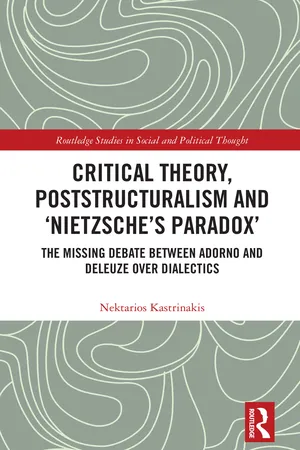
Critical Theory, Poststructuralism and ‘Nietzsche’s Paradox’
The Missing Debate Between Adorno and Deleuze Over Dialectics
- English
- ePUB (mobile friendly)
- Available on iOS & Android
Critical Theory, Poststructuralism and ‘Nietzsche’s Paradox’
The Missing Debate Between Adorno and Deleuze Over Dialectics
About this book
Critical Theory, Poststructuralism and 'Nietzsche's Paradox' addresses a fundamental question in the exchange between Critical Theory and poststructuralism: is poststructuralism justified in its critique of dialectical thinking and in the conclusion of this critique that we need to leave dialectics behind us to properly understand the social world?
When Deleuze's book Nietzsche and Philosophy was first published back in 1962, it caused a sensation in France, and its Nietzschean critique of Hegelian dialectics played a pivotal role in the emergence of the current of thought we call poststructuralism. However, to what extent is this critique valid and justified? This question has never been adequately investigated. With this book, Nektarios Kastrinakis attempts such an investigation through the exploration of the influence of Nietzsche in both Deleuze and Adorno. More specifically, he investigates a paradox in 20th-century philosophy, the 'paradox of Nietzsche': Nietzsche is claimed by Deleuze to be a fierce critic of Hegel's dialectics and by authors like Gillian Rose and Karin Bauer to be the originator of Adorno's negative dialectics. Kastrinakis argues that there are in fact at least 'two Nietzsches,' one with an irrationalistic and one with a rationalistic critique of identity thinking, on which both poststructuralism/Deleuze and Critical Theory/Adorno, respectively, lay a legitimate claim. He moreover enacts the missing in the literature debate between Adorno and Deleuze, which concludes that Adorno's critique of identity thinking (his negative dialectics), when modified to include an affirmative moment at its heart, unacknowledged by Adorno himself, can effectively challenge Deleuze's Nietzschean critique of dialectics.
Critical Theory, Poststructuralism and 'Nietzsche's Paradox' intervenes in the boundary between political philosophy and philosophy and will be of interest to scholars of Nietzsche, Deleuze, Adorno but also generally of poststructuralism and Critical Theory in these disciplines.
Frequently asked questions
- Essential is ideal for learners and professionals who enjoy exploring a wide range of subjects. Access the Essential Library with 800,000+ trusted titles and best-sellers across business, personal growth, and the humanities. Includes unlimited reading time and Standard Read Aloud voice.
- Complete: Perfect for advanced learners and researchers needing full, unrestricted access. Unlock 1.4M+ books across hundreds of subjects, including academic and specialized titles. The Complete Plan also includes advanced features like Premium Read Aloud and Research Assistant.
Please note we cannot support devices running on iOS 13 and Android 7 or earlier. Learn more about using the app.
Information
Table of contents
- Cover
- Half Title
- Series
- Title
- Copyright
- Dedication
- Contents
- Acknowledgements
- List of Abbreviations
- Introduction
- 1 Nietzsche, the philosopher of the unconscious and of nonidentity
- 2 Deleuze’s project as it unfolds in Nietzsche and Philosophy, Difference and Repetition and Anti-Oedipus
- 3 Adorno’s project as it unfolds in Dialectic of Enlightenment and Negative Dialectics
- 4 Deleuze’s and Adorno’s Nietzsche, ‘Nietzsche’s paradox’ and a critical debate between Critical Theory and poststructuralism over dialectics
- Conclusion: the theoretical and political consequences of our argument for the thought of Nietzsche, poststructuralism and Critical Theory
- Appendix
- Index